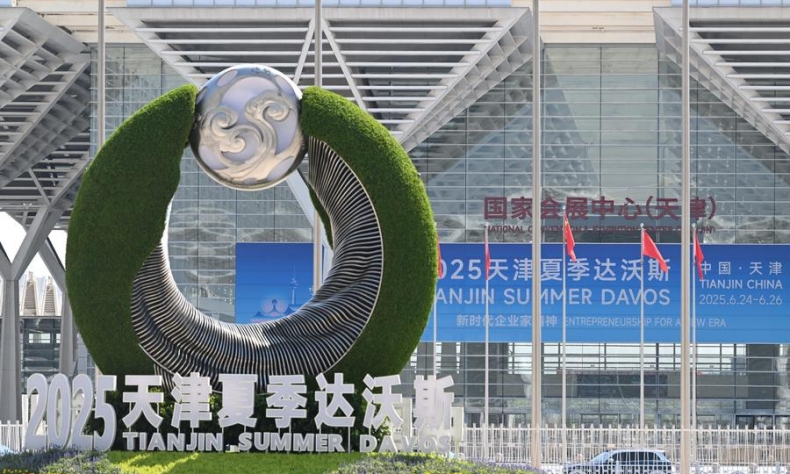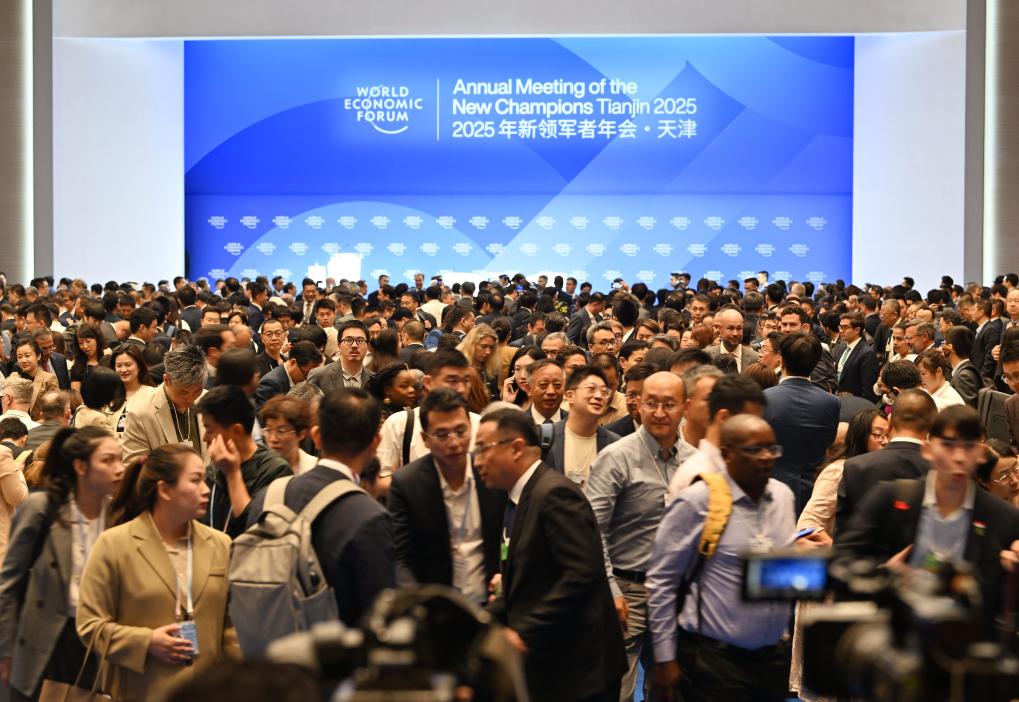2025 Summer Davos Underscores Global Cooperation with China in Emerging and Future Industries

Deeper economic relations with China have the potential to spark innovation, encourage development, and help create a more resilient, sustainable, and equitable global economy.
The 16th Annual Meeting of the New Champions, also known as the 2025 Summer Davos, was held in north China’s Tianjin Municipality from June 24 to 26. It highlights China’s growing influence in global economic governance, its appeal in future industries, and its commitment to promoting comprehensive economic ties with the world in the face of global trade uncertainty and tech protectionism.
The forum’s global recognition and significance are underscored by the participation of over 1,700 prominent figures from business, government, academia, and civil society across 90 countries and regions. They came to explore how innovation, entrepreneurship, and emerging technologies spark and reset global growth. They also gained a deeper understanding of China’s high-quality economic development and continued efforts to promote high-level opening-up.
As the world deals with issues including rising trade protectionism, supply chain disruption risk, and trade fragmentation, this year’s event addressed a number of important topics. Holding the forum at this pivotal moment strengthens global collaboration and innovation networks, and reaffirms China’s stellar role in global technological and industrial value chain. At a time when productivity and resources are being driven by fast technological transformation, and as China advances innovation-driven development strategies with a focus on talent cultivation and sci-tech innovation to navigate geopolitical risks, the forum also sparks a new spirit of global multilateral cooperation in the emerging industries and hi-tech industrial entrepreneurship. With its innovative ecosystem and strength, China has been a crucial partner in this shift, propelling global prosperity.
Chinese Premier Li Qiang delivered a keynote speech at the opening plenary of the forum on June 25. He highlighted both positive trends, such as the increasing diversity and growth of the Global South, and negative trends, such as the volatile declines in cross-border investment and the growing risks of fragmented production and supply chains.
Li’s forward-looking speech demonstrated China’s commitment to actively participating in international economic cooperation on innovation and entrepreneurship, as well as in addressing global challenges. He advocated for resolving differences in economic and trade relations through equal consultation. He also highlighted China’s dedication to economic recovery, stability, and opening up, pointing out that the country’s GDP grew by 5.4 percent in the first quarter of 2025. “China’s economic development is not a short-term expansion but a steady progression toward long-term goals.”

Amid supply chain fragmentation and tech bullying tendencies by some countries, China is pivotal in reorganizing and optimizing global industrial networks and global competitiveness. China’s investments in hi-end manufacturing, AI, 5G, the digital economy, and green technologies are tackling global challenges and promoting mutual benefit. Emerging sectors such as integrated circuits, AI, BeiDou navigation, humanoid and industrial robotics, the low-altitude economy, and domestically produced trunk line airplanes have grown rapidly as a result of China’s innovation-driven development. These new technologies and business models are creating fresh growth opportunities for many nations, contributing to a more dynamic and resilient global economy.
As the acceleration of emerging industries highlight the global market, global innovation is closely intertwined with Chinese modern industrial and innovation ecosystem. The global business community is eager to expand collaboration with China as a result. This presents enormous prospects for the globe due to China’s technological breakthroughs, 4.0 industrialization and entrepreneurial ecosystem.
China jumped from 12th to 11th rank in just one year, according to the Global Innovation Index 2024. China’ research and development spending increased 8.3 percent in 2024, which made for 2.68 percent of its GDP. In 2024, the added value of the digital economy’s core industries made up around 10 percent of GDP. China’s AI industry will reach 1.73 trillion yuan by 2035, accounting for 30.6 percent of the world’s total. The success of the Chinese AI startup DeepSeek has encouraged entrepreneurs to create products and services, and technology has improved grain output, food security, and rural revitalization. It also opens up new avenues for international AI cooperation.
Premier Li Qiang underlined the nation’s desire to share its cutting-edge technology with the world, promote international cooperation, and foster a market-oriented, world-class business environment governed by a sound legal framework. “China’s innovation is open and open-source. We are willing to share indigenous technologies and innovation scenarios with the world, and support international collaboration in research, development, application and popularization, in order to advance innovation-driven development in all countries through openness and cooperation,” Li said.
The idea of China’s “new quality productive forces” has drawn interest from all around the world. Since China’s industry has offered business prospects for both domestic and international enterprises operating in the country, numerous global businesses are eager to invest in China. Numerous unicorn enterprises, startups, and “little giant” businesses are located in the 178 high-tech zones, demonstrating the tremendous potential of investing in and forming business partnerships with these Chinese businesses.
To invest in China is to tap into the massive market while advancing sustainable and inclusive growth. Beyond being a powerhouse in high-end manufacturing, China is also striving to become a mega-sized consumer market that generates new demand for the whole world. Deeper economic relations with China have the potential to spark innovation, encourage development, and help create a more resilient, sustainable, and equitable global economy.
The author is a banker from Bangladesh and an analyst specializing in strategic and global economic affairs.
The article reflects the author’s opinions, and not necessarily the views of China Focus.
 Facebook
Facebook
 Twitter
Twitter
 Linkedin
Linkedin
 Google +
Google +










